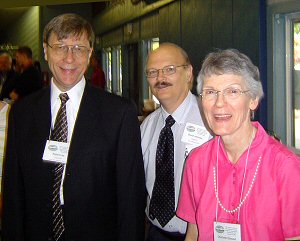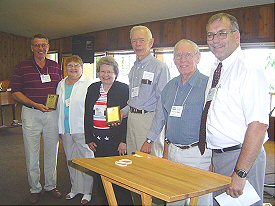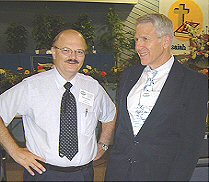AFLC 2006 Conference

Pastor Dave Johnson represented Silverhill's Zion Lutheran Church at
the Association Free Lutheran Congregations' Annual Conference in
Stanwood, WA, at the Warm Beach Conference Center, June 20- 23, 2006.
The Annual Conference is the meeting at which representatives to the
various corporations and organizations of the AFLC are nominated. The
AFLC has a very loose structure in the sense that the Annual Conference
does not control the Association of Free Lutheran Congregations. The
Annual Conference is not unlike a rally, as opposed to being a formal,
synodical business meeting. Each of the six corporation entities
comprising the AFLC would continue to function autonomously whether or
not the Annual Conference met. The concept behind the loose structure
was to prevent any part of the church organization from dominating the
whole. (The AFLC is comprised of about 280 congregations throughout
the USA at this time.)

AFLC President Robert Lee (l), familiar to a number of folks
in Baldwin County because of visits to Zion Lutheran Church in
Silverhill, posed briefly with Zion's Pastor Dave Johnson. Pastor
Lee's Executive Secretary Charlotte Oswood (r) is a member of Pastor
Dave's previous church in Minneapolis, MN.
The predecessor to the AFLC was more centralized than the present AFLC.
The previous body was ruled "synodical" in the mergers of the 1960s
when its leadership elected to merge with a variety of other Lutheran
groups. As a result, much of the predecessor body, the "Lutheran Free
Church," was absorbed into the "American Lutheran Church" with limited
opportunity of opting out of the merged church body. That new church
body did not continue the traditional stance on the authority of
Scripture previously present in the LFC. That ALC subsequently was
absorbed into the "Evangelical Lutheran Church of America" which has
embraced an even more limited view on the authority of the Scriptures.
Many rural congregations have suffered in these series of mergers,
because the successor church bodies have been more concerned with
augmenting and nurturing large, urban churches. They have felt that
rural congregations are marginal because they are generally smaller
congregations with limited financial resources.

Pastor Paul Nash was busy at events. Pastor Dave and Pastor Paul shared a room during the Annual Conference. "Greet my friends at Zion," were Pastor Paul's words as he ran off to another Home Missions mini-meeting. Here at one such event, Pastor Nash (right) recognized folks working with "Builders Fellowship" which provides assistance to churches seeking to build or modify their facilities.
Only 40 churches were able to disentangle themselves from that early
merger in the 1960s, becoming the seed for today's AFLC. The result
was the AFLC organization in the 1960s. The AFLC is the fourth largest
national church body of Lutherans. Its member churches are urban,
suburban, and rural. AFLC churches tend to be small, but several AFLC
churches have worshipping fellowships of a thousand or more.

Pastor Dave greeted congregational friend, Dr. John Eidsmoe. This fellow Alabamian has a special affection for Silverhill's Zion.
The AFLC remains orthodox, fully subscribing to the Scriptures.
Today's society has attempted to remake the church in its own image,
not the image of God. By some, the AFLC appears to be an anachronism
because it subscribes fully to the Bible. The AFLC is a church body
that recognizes the Bible as infallible ("the whole Bible is the Word
of God") and inerrant ("there are no mistakes in the Bible or in its
transcription by the 'amanuensis,' God's agent for writing down His
Word").
Unlike the synodical churches which include the largest Lutheran
denomination, the ELCA, and the second largest, the Lutheran
Church--Missouri Synod, the AFLC is totally congregational in its
organization as an association of churches. This means there is no
bishop or head of the AFLC as in the synodical Lutheran bodies.
Instead, the AFLC is fully congregational in its church autonomy. It
subscribes to the historical Christian and Lutheran Confessions and to
a series of democratic principles and documents describing the
relationships between member churches, the primary one being the
"Fundamental Principles for Work." The AFLC Annual Conference elects a
"president," but his office is limited; for other Lutherans, he might
be seen as a kind of "bishop" for the Association.
Pastor Dave reported that there were many resolutions passed at the
Annual Conference, many including resolutions for prayer on specific
needs and projects. Many nominations for other bodies within the loose
AFLC structure were accomplished. A variety of other issues were
discussed and positions taken. The Conference endorsed a formal
position on women in ministry, for example, reserving the pastorate for
male believers based on the "Order of Creation." This position relates
to the leading of worship and teaching and is based on a careful study
of the semantics underlying the original Greek text of the New
Testament Scriptures. This position does not negate or undermine the
role of every believer as a Christian priest in his or her own right as
a believing Christian, as the Bible says. This is sometimes called the
"Priesthood of All Believers" and is a position derived from Romans 12,
1 Corinthians 12, and 1 Peter 2. All AFLC Lutherans are called on to
use their gifts for the edification of the church, regardless of
gender. The Conference commissioned missionaries to Uganda and
Ukraine, on invitation from national churches. Numbers of affiliated
corporation and organization reports were received by the Annual
Conference. A summary of business is reported in the "Conference
Report to the Forty-Fourth Annual Conference of the Association of Free
Lutheran Congregations" which is archived at Zion Lutheran Church and
available for perusal by the curious.
Zion Lutheran Church, Alabama's only AFLC Lutheran church, is located a
block south of State Highway 104 at 15875 4th Avenue and 7th Street in
beautiful Silverhill. It withdrew from the ELCA in the mid-1990s and
affiliated with the AFLC. Historically Zion was part of the Swedish
Lutheran Augustana Synod, a synod friendly to Lutheran pietism, a
position less and less palatable to successive church mergers. It was
fortunate in discovering that the AFLC is not unfriendly to Lutheran
pietism, having former elements of the Hauges and other pietistic
Lutheran churches in its association.






|
|
|
|